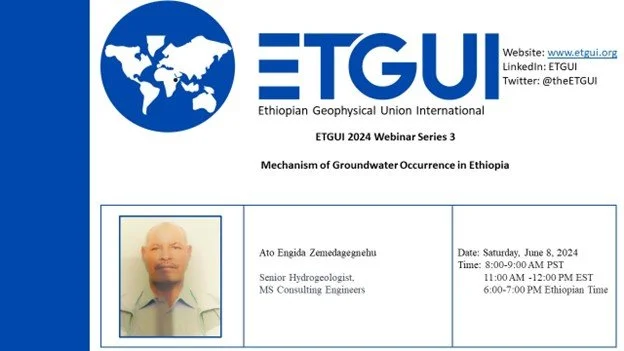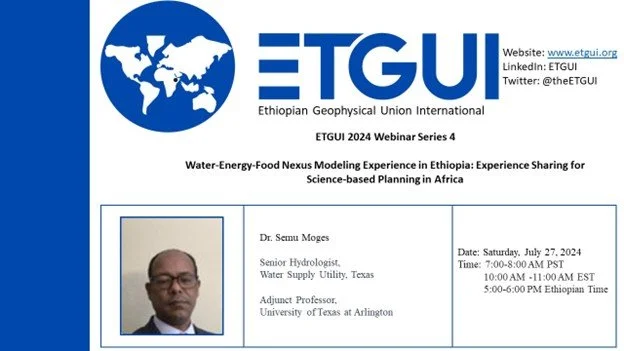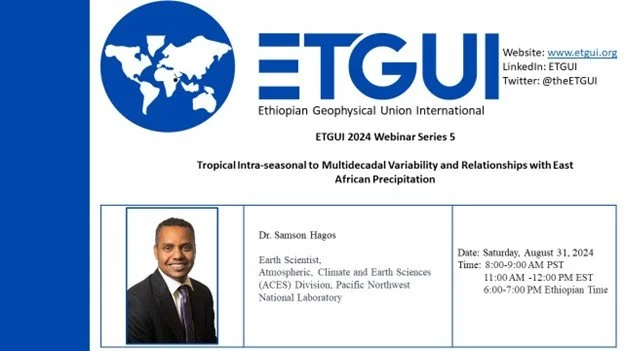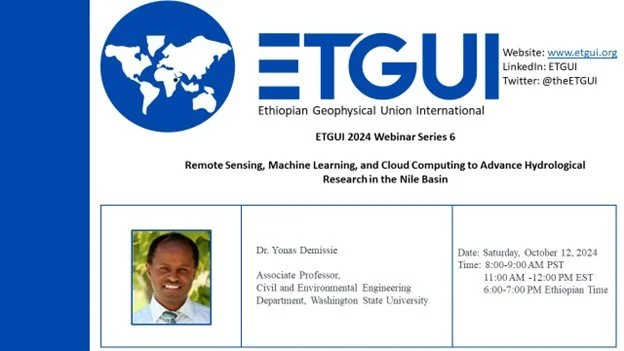Webinar Series 2024
ETGUI holds webinar series throughout the year. In 2024, ETGUI held 6 webinars with presentations by experts from diverse water fields. Each presentation was followed by enthusiastic discussions from attendees tuning in from across the US, Ethiopia and Europe. The webinars focused mostly on Ethiopian case studies, but the wider eastern African and African contexts were also explored.
On our first webinar, Dr. Tufa Dinku, a senior research scientist at Columbia University, did an expose of the impactful program he leads at his university: Enhancing National Climate Services (ENACTS). He shared progress ENACTS has made in collaboration with National Meteorological Services in Africa on improving coverage, length, and quality of climate data by combining available local observations with globally available satellite rainfall estimates and climate model reanalysis products. While ENACTS has been implemented in over 15 countries in Africa, his presentation provided an overview of this work in Ethiopia which has resulted in the generation of over 40 years of rainfall and air temperature time series at about 4km spatial resolution.
In our second webinar, Dr. Tirusew Assefa, lead for the decision support group at Tampa Bay Water, shared his experience on the Master Water Supply Planning efforts for a major metropolitan area in Southeast US (Tampa-St. Petersburg) and explored lessons that can inform solving the chronic Addis Ababa water shortage.
Our third speaker, Ato Engida Zemedagegnehu, a senior Hydrogeologist at Water Supply Utility in Texas, dove into the groundwaters of Ethiopia. He shared his expansive experience on the main mechanisms of groundwater occurrence in Ethiopia which have been substantiated by detailed groundwater studies of Addis Ababa, Afar Triangle volcanic aquifer and Dire Dawa wellfield assessment, among others.
Our Fourth speaker, Dr. Semu Mogoes, an academic and professional water resources engineer, shared his recent collaborative research on Ethiopia's macro-scale joint Water-Energy-Food Nexus development trajectories. He explored a sustainable national development path to achieve a middle-income economic level without resource degradation with aims to re-invigorate similar nexus studies for national and urban scale planning in the context of Africa.
Our Fifth speaker, Dr. Samson Hagos, a senior scientist at the Pacific Northwest National Library, shed light, arguably, on an area that is not widely explored in the Ethiopian context by delving into the various atmospheric phenomena that affect the East African Precipitation. He explored phenomena like the El Nino Southern Oscillation (ENSO), Madden-Julian Oscillation (MJO), Indian Ocean Dipole (IOD), Pacific Decadal Oscillation (PDO), and regional monsoons and their relations with long-term spring rainfall in Eastern Africa.
Our Final webinar by Dr. Yonas Demissie, an associate professor at Washington State University, was particularly engaging where he elucidated the vast potential of machine learning, remote sensing and cloud computing specifically geared to the Ethiopian context by using the Blue Nile as a case study. He demonstrated how the challenges of data scarcity can be tackled by utilizing remote sensing and machine learning which results in outputs on par with that of physics-based models. Furthermore, he illustrated how the challenges of computing power can be alleviated by cloud computing platforms like Google Collab and Google Earth Engine.
As briefly summarized here, it is clear the webinars explored topics that are cutting edge as well as classical, and all warranting further exploration. It also showed the depth and diverse expertise we have in the ETGUI network working on water issues that are directly on Ethiopia or on topics that can be translated to Ethiopian and the wider African context. We believe this can and will be leveraged to help address the multi-faceted challenge we face in Ethiopia on water and other Natural Resources. Finally, although it goes without saying, it is worth noting that our presenters were inspiring as much as they were informing, and we will continue to collaborate further with them.






